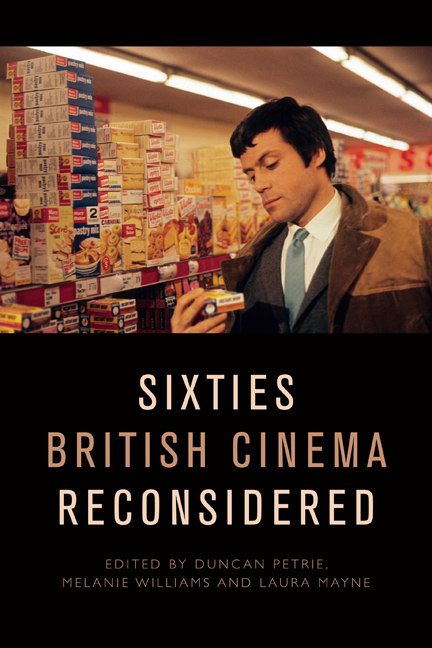Book contents
- Frontmatter
- Contents
- List of Figures and Tables
- Notes on the Contributors
- Introduction
- PART ONE STARS AND STARDOM
- 1 Male Stardom in 1960s British Cinema
- 2 ‘Rebel Rebel’?: Oliver Reed in the 1960s
- 3 Carol White: The Bardot of Battersea
- 4 ‘The Old Wave at Work’: The Transatlantic Stardom of the British Character Actress in the 1960s
- PART TWO CREATIVE COLLABORATIONS
- 5 Woodery-pokery: Charles Wood’s Sixties Screenwriting
- 6 ‘Beyond Naturalism’: Jocelyn Herbert, If . . . (1968) and Design for Performance in 1960s British Cinema
- 7 Kes: From Page to Screen
- 8 ‘I’d like to remember you as you are – as just a grumpy old man’: Joseph Losey and the Making of Figures in a Landscape (1970)
- PART THREE STYLE AND GENRE
- 9 ‘Wholesome rough stuff’: Hammer Films and the ‘A’ and ‘U’ Certificate, 1959–65
- 10 Widescreen Pyrotechnics: Shot Composition and Staging in the Cold War Films of Joseph Losey and Sidney J. Furie
- 11 The Rise and Fall of the Colourful Corporate Fantasy in 1960s British Cinema
- 12 Witchfinders and Sorcerers: Sorcery and Counterculture in the Work of Michael Reeves
- PART FOUR CULTURAL TRANSFORMATIONS
- 13 ‘An Impulse of Anger, Instantly Regretted’: Rebellion and Reaction in the Early-1960s Naval Film
- 14 Narratives of Race and Identity in Sixties British Cinema
- 15 Panic at the Disco: Brainwashing, Alienation and the Discotheque in Swinging London Films
- Index
8 - ‘I’d like to remember you as you are – as just a grumpy old man’: Joseph Losey and the Making of Figures in a Landscape (1970)
Published online by Cambridge University Press: 22 September 2020
- Frontmatter
- Contents
- List of Figures and Tables
- Notes on the Contributors
- Introduction
- PART ONE STARS AND STARDOM
- 1 Male Stardom in 1960s British Cinema
- 2 ‘Rebel Rebel’?: Oliver Reed in the 1960s
- 3 Carol White: The Bardot of Battersea
- 4 ‘The Old Wave at Work’: The Transatlantic Stardom of the British Character Actress in the 1960s
- PART TWO CREATIVE COLLABORATIONS
- 5 Woodery-pokery: Charles Wood’s Sixties Screenwriting
- 6 ‘Beyond Naturalism’: Jocelyn Herbert, If . . . (1968) and Design for Performance in 1960s British Cinema
- 7 Kes: From Page to Screen
- 8 ‘I’d like to remember you as you are – as just a grumpy old man’: Joseph Losey and the Making of Figures in a Landscape (1970)
- PART THREE STYLE AND GENRE
- 9 ‘Wholesome rough stuff’: Hammer Films and the ‘A’ and ‘U’ Certificate, 1959–65
- 10 Widescreen Pyrotechnics: Shot Composition and Staging in the Cold War Films of Joseph Losey and Sidney J. Furie
- 11 The Rise and Fall of the Colourful Corporate Fantasy in 1960s British Cinema
- 12 Witchfinders and Sorcerers: Sorcery and Counterculture in the Work of Michael Reeves
- PART FOUR CULTURAL TRANSFORMATIONS
- 13 ‘An Impulse of Anger, Instantly Regretted’: Rebellion and Reaction in the Early-1960s Naval Film
- 14 Narratives of Race and Identity in Sixties British Cinema
- 15 Panic at the Disco: Brainwashing, Alienation and the Discotheque in Swinging London Films
- Index
Summary
Joseph Losey, the blacklisted American film director, relocated to Britain in 1953. He restarted his career with The Sleeping Tiger (1954) and continued to make a further twenty films in the United Kingdom until the mid-1970s. Throughout his career, Losey developed a reputation for being a temperamental and intense director, both awkward and accomplished in equal measure. His critical reputation in the early 1960s was mixed. Sight & Sound labelled Losey a ‘cult’ director, and gave Blind Date (1959) a one-star rating. Movie, however, treated him with reverent adulation, noting that: ‘Losey has managed to produce three films which can stand comparison with practically anything that other countries can offer: Time Without Pity [1957], Blind Date, and The Criminal [1960].’ He was the highest rated ‘British’ director in a talent histogram the magazine devised for its inaugural issue in 1962 (rated ‘Brilliant’) with no apparent irony that he was in fact American. It was after the release of The Servant (1963) that Sight & Sound began to lionise the director, affording the film a three-star rating, and noting: ‘One does not need to subscribe wholeheartedly to the auteur theory to be convinced that this quality derives as much from Losey['s …] strong personal style and drive.’ Beyond an evolving critical reputation, it is also evident that while Losey developed positive working relationships with actors such as Stanley Baker and Dirk Bogarde, he was disliked equally by others, including Glenda Jackson and Malcolm McDowell.
Losey's films and career have been written about extensively by David Caute, Edith de Rham and Colin Gardner among others, with much of the analysis focusing on him as a creative and artistic auteur. However, less research has been conducted on his filmmaking practices. In exploring Losey through the lens of production history, this chapter draws upon the director's personal papers held in the British Film Institute's Special Collections and, of particular significance, the production files held in the archive of the completion guarantor Film Finances Limited.
Founded in 1950 by Robert Garrett, a film producer, and Peter Hope, an insurance broker for Lloyds, Film Finances specialises in providing guarantees of completion on film productions to lending banks and distributors.
- Type
- Chapter
- Information
- Sixties British Cinema Reconsidered , pp. 131 - 148Publisher: Edinburgh University PressPrint publication year: 2020



